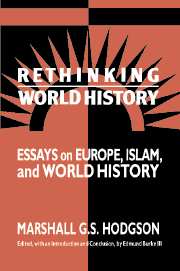Book contents
Introduction: Marshall G. S. Hodgson and world history
Published online by Cambridge University Press: 18 December 2009
Summary
Something important has been happening to the writing of world history in the past two decades. A scholarly tradition that was rooted in the paradigm of civilizational studies has been challenged from both within and without. As a result of the collapse of the sense of moral exceptionalism which had privileged the West above the rest of humanity as well as a new sense of global interdependence historians have expanded their focus. As a consequence, comparative history has had an increasing impact even on the writing of American history. Neither the history of slavery in the Old South nor that of Reconstruction will ever again be the same. The contribution of Marxism to this new awareness of the ways in which the different societies are linked to one another in time and space is evident. Immanuel Wallerstein, Eric Hobsbawm, Eric Wolf – but also Andre Gunder Frank and Samir Amin – have developed historical accounts of the rise of capitalism that stress the shaping impact of the world economy. In so doing they have devised new conceptual tools for discussing the history of humanity, and a new terrain on which to situate it. The social and economic interactions of peoples, rather than the cultural interchanges of civilizations, constitute the basic building blocks of this new perspective.
Important though the contributions of those working within the Marxist tradition have been, the remaking of world history owes perhaps more to the work of William McNeill, whose The Rise of the West has provided students with a comprehensive account of the history of the world within the tradition of civilizational studies.
- Type
- Chapter
- Information
- Rethinking World HistoryEssays on Europe, Islam and World History, pp. ix - xxiiPublisher: Cambridge University PressPrint publication year: 1993
- 4
- Cited by

